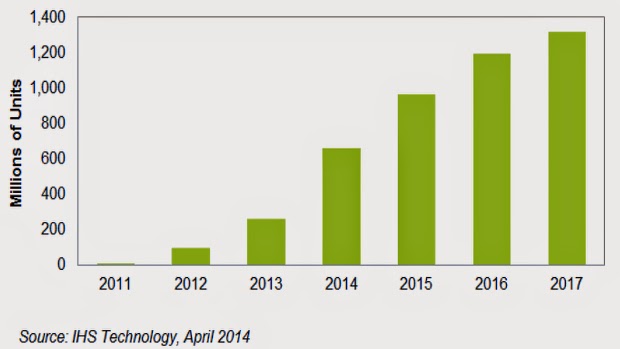 |
| Microchip Sensor Hub |
In case sensor hubs are new to you, Wikipedia defines them as:
"...a microcontroller unit/coprocessor/DSP that helps to integrate data from different sensors and process them. This technology can help off-load these jobs from a product's main application processor, thus saving battery consumption and providing a performance improvement."(As an aside, if you know a lot about sensor hubs and feel Wikipedia is a valuable resource, you might want to consider contributing content about sensor hubs to the Wikipedia entry. It is currently labeled as a stub.)
There are several reasons sensor hubs are of interest to me. First, I'm trying to learn all I can about microcontrollers, and it appears some sensor hubs are built with an MCU core. Second, I'm very interested in using sensors in MCU projects, and understanding sensor hubs will likely help me do a better job of designing and building sensor-dependent applications. Third, sensors are an emerging area of consumer technology, primarily because of smartphones, and mobile computing devices over the next few years are going to include a growing number of sensors. This chart, above left, from an Electronics360 article indicates the rapidly growing market for sensor hubs.
Atmel's sensor hub webpage mentions some of the sensors and mobile computing devices their MCU sensor hub systems are designed for:
"These can include motion sensors (accelerometers, gyroscopes and magnetometers), environment sensors (light level, color, temperature, pressure, humidity) and many others...These systems are required in a broad range of products such as smartphones, tablets, ultrabooks, IoT- (Internet of Things) enabled devices, gaming, healthcare, and wearable computing."An article from April 2014, "Atmel, Qualcomm, NXP Lead Booming Sensor Hub Market" indicated Atmel has the leading market share (32%) for sensor hubs. The article goes on to say:
"The use of sensor hubs is increasingly crucial because of the push for 'always on' sensors used for activity monitoring, voice-command operation and contextual awareness...Three approaches are being taken to the provision of sensor hubs according to the report. One approach employs an external hub, typically a dedicated microcontroller (MCU), as offered by chipmakers such as Atmel, STMicroelectronics, Texas Instruments and NXP Semiconductor. Recent smartphones that use this approach include the Apple iPhone 5s, Samsung Galaxy S5 and the Motorola Moto X. A second method utilizes a low-power sensor hub as a low-power core that is part of the application processor, offered by Qualcomm, Intel and Nvidia. In future the Samsung Exynos range and MediaTek and HiSilicon are expected to follow this route...The integrated approach will overtake the MCU approach in the market after 2016...A third way for implementing sensor hubs is to integrate the hub logic, typically an MCU, with a cluster of sensors, typically an accelerometer and gyroscope. The accelerometer and gyroscope are the most common sensor combination, allowing for various levels of activity and motion tracking, ranging from step counting to more detailed motion tracking and contextual awareness."It appears MCUs' role in sensor hubs may be short-lived for smartphones and other super-high volume mobile computing devices. But for battery-powered MCU 'maker' projects with lots of sensors, the ultra-low power MCU-based sensor hub may play an important role, or at least provide some good insights on effective circuit design. At the next Humboldt Microcontrollers Group meeting, I'll be asking if Ed or any of the others at the meeting have experience with sensor hubs.
**********

No comments:
Post a Comment